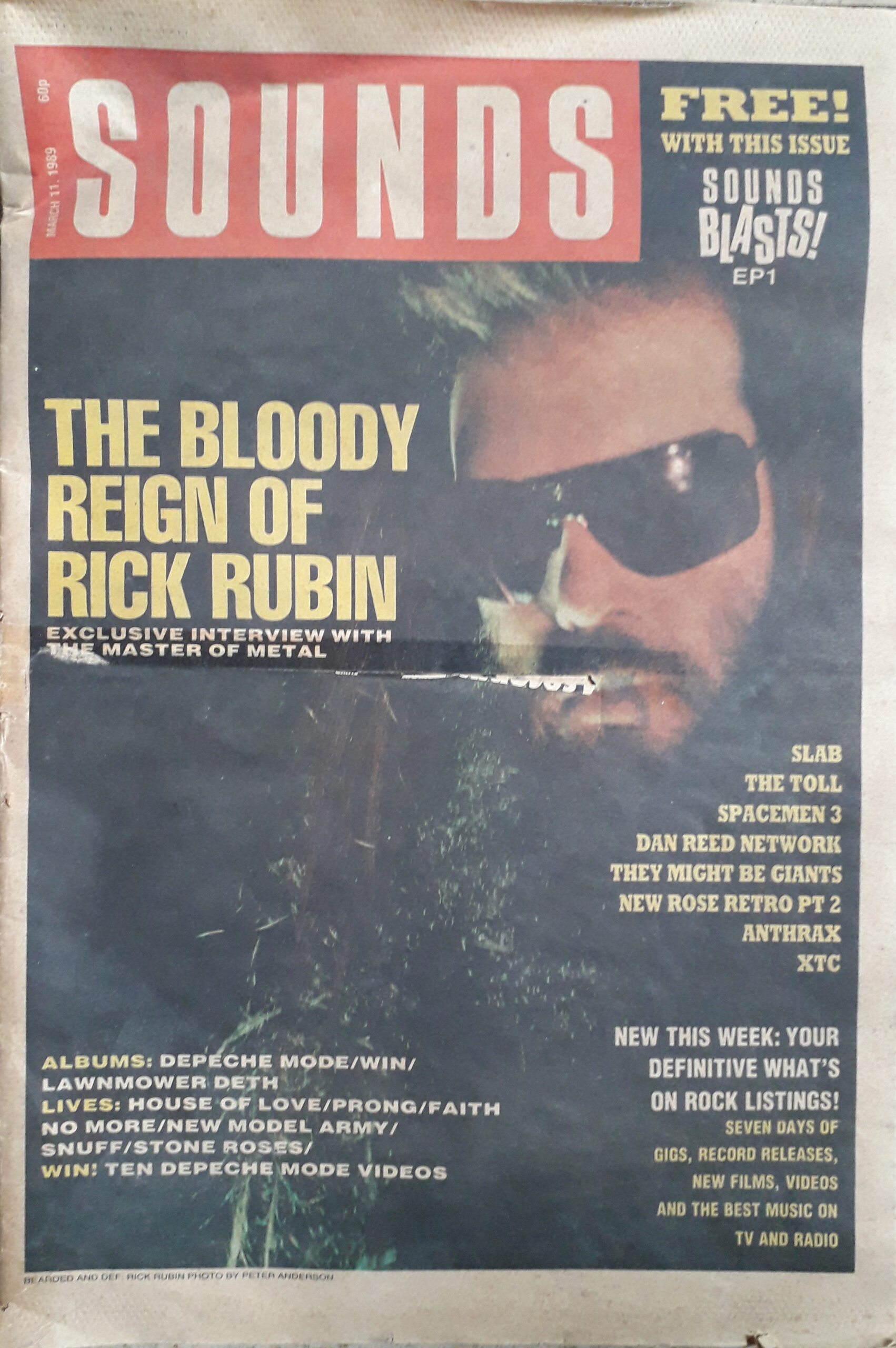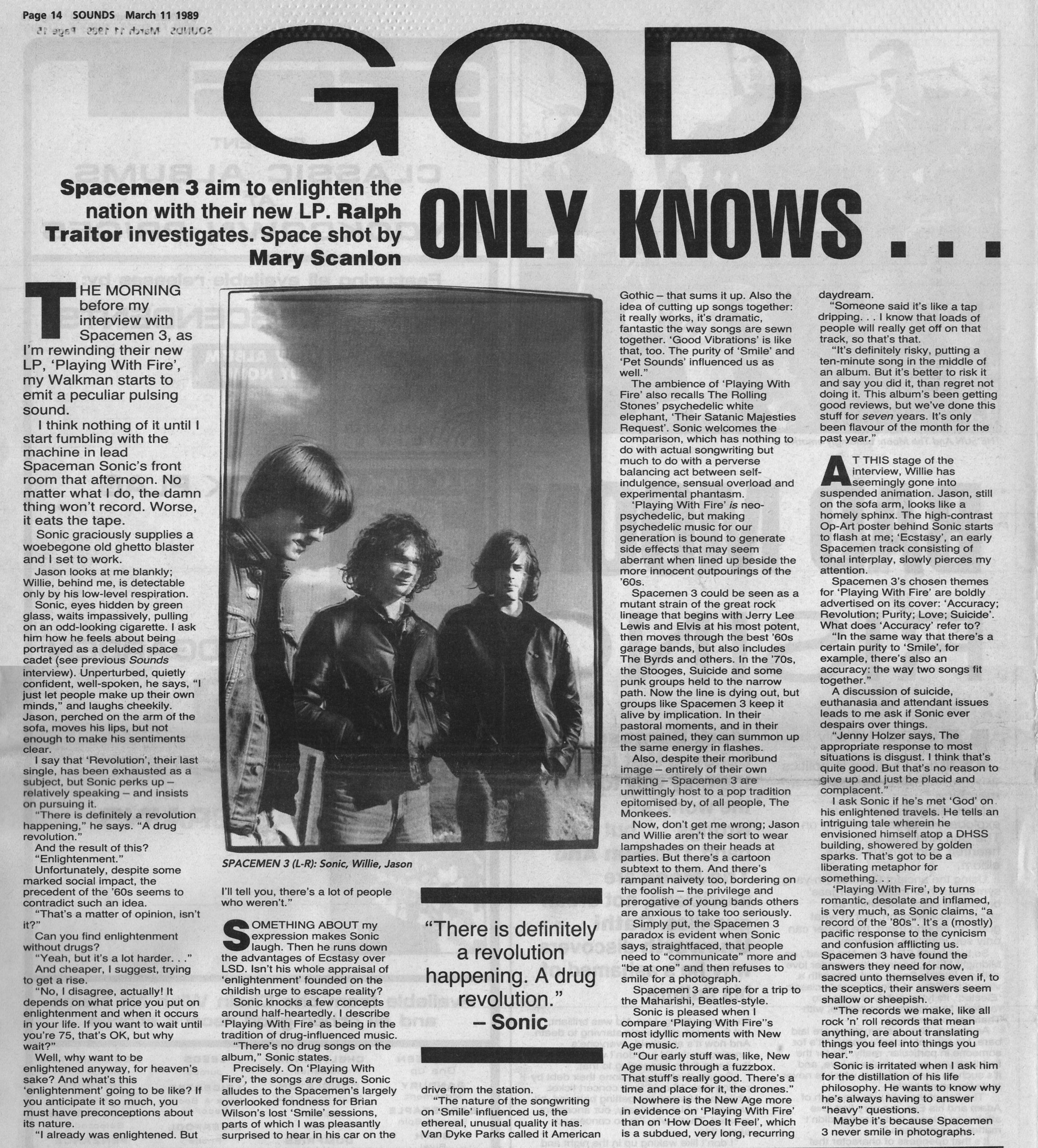God Only Knows…
Spacemen 3 aim to enlighten the nation with their new LP. Ralph Traitor investigates. Space shot by Mary Scanlon.
The morning before my interview with Spacemen 3, as I’m rewinding their new LP, ‘Playing With Fire’, my Walkman starts to emit a peculiar pulsing sound.
I think nothing of it until I start fumbling with the machine in lead Spaceman Sonic’s front room that afternoon. No matter what I do, the damn thing won’t record. Worse, it eats the tape.
Sonic graciously supplies a woebegone old ghetto blaster and I set to work.
Jason looks at me blankly; Willie, behind me, is detectable only by his low-level respiration.
Sonic, eyes hidden by green glass, waits impassively, pulling on an odd-looking cigarette. I ask him how he feels about being portrayed as a deluded space cadet (see previous Sounds interview). Unperturbed, quietly confident, well-spoken, he says, “I just let people make up their own minds,” and laughs cheekily. Jason, perched on the arm of the sofa, moves his lips, but not enough to make his sentiments clear.
I say that ‘Revolution’, their last single, has been exhausted as a subject, but Sonic perks up – relatively speaking – and insists on pursuing it.
“There is definitely a revolution happening,” he says. “A drug revolution.”
And the result of this?
“Enlightenment.”
Unfortunately, despite some marked social impact, the precedent of the ‘60s seems to contradict such an idea.
“That’s a matter of opinion, isn’t it?”
Can you find enlightenment without drugs?
“Yeah, but it’s a lot harder…”
And cheaper, I suggest, trying to get a rise.
“No, I disagree, actually! It depends on what price you put on enlightenment and when it occurs in your life. If you want to wait until you’re 75, that’s OK, but why wait?”
Well, why want to be enlightened anyway, for heaven’s sake? And what’s this ‘enlightenment’ going to be like? If you anticipate it so much, you must have preconceptions about it’s nature.
“I already was enlightened. But I’ll tell you, there’s a lot of people who weren’t.”
Something about my expression makes Sonic laugh. Then he runs down the advantages of Ecstasy over LSD. Isn’t his whole appraisal of ‘enlightenment’ founded on the childish urge to escape reality?
Sonic knocks a few concepts around half-heartedly. I describe ‘Playing With Fire’ as being in the tradition of drug-influenced music.
“There’s no drug songs on the album,” Sonic states.
Precisely. On ‘Playing With Fire’, the songs are drugs. Sonic alludes to the Spacemen’s largely overlooked fondness for Brian Wilson’s lost ‘Smile’ sessions, parts of which I was pleasantly surprised to hear in his car on the drive from the station.
“The nature of the songwriting on ‘Smile’ influenced us, the ethereal, unusual quality it has. Van Dyke Parks called it American Gothic – that sums it up. Also the idea of cutting up songs together: it really works, it’s dramatic, fantastic the way songs are sewn together. ‘Good Vibrations’ is like that, too. The purity of ‘Smile’ and ‘Pet Sounds’ influenced us as well.”
The ambience of ‘Playing With Fire’ also recalls The Rolling Stones’ psychedelic white elephant, ‘Their Satanic Majesties Request’. Sonic welcomes the comparison, which has nothing to do with actual songwriting but much to do with a perverse balancing act between self-indulgence, sensual overload and experimental phantasm.
‘Playing With Fire’ is neo-psychedelic, but making psychedelic music for our generation is bound to generate side effects that may seem aberrant when lined up beside the more innocent outpourings of the ‘60s.
Spacemen 3 could be seen as a mutant strain of the great rock lineage that begins with Jerry Lee Lewis and Elvis at his most potent, then moves through the best ‘60s garage bands, but also includes The Byrds and others. In the ‘70s, the Stooges, Suicide and some punk groups held to the narrow path. Now the line is dying out, but groups like Spacemen 3 keep it alive by implication. In their pastoral moments, and in their most pained, they can summon up the same energy in flashes.
Also, despite their moribund image – entirely of their own making – Spacemen 3 are unwittingly host to a pop tradition epitomised by, of all people, The Monkees.
Now, don’t get me wrong; Jason and Willie aren’t the sort to wear lampshades on their heads at parties. But there’s a cartoon subtext to them. And there’s rampant naivety too, bordering on the foolish – the privilege and prerogative of young bands others are anxious to take too seriously.
Simply put, the Spacemen 3 paradox is evident when Sonic says, straightfaced, that people need to “communicate” more and “be at one” and then refuses to smile for a photograph.
Spacemen 3 are ripe for a trip to the Maharishi, Beatles-style.
Sonic is please when I compare ‘Playing With Fire’’s most idyllic moments with New Age music.
“Our early stuff was, like, New Age music through a fuzzbox. That stuff’s really good. There’s a time and a place for it, the drones.”
Nowhere is the New Age more in evidence on ‘Playing With Fire’ than on ‘How Does It Feel’, which is a subdued, recurring daydream.
“Someone said it’s like a tap dripping… I know that loads of people will really get off on that track, so that’s that.
“It’s definitely risky, putting a ten-minute song in the middle of an album. But it’s better to risk it and say you did it, than regret not doing it. This album’s been getting good reviews, but we’ve done this stuff for seven years. It’s only been flavour of the month for the past year.”
At this stage of the interview, Willie has seemingly gone into suspended animation. Jason, still on the sofa arm, looks like a homely sphinx. The high-contrast Op-Art poster behind Sonic starts to flash at me; ‘Ecstasy’, an early Spacemen track consisting of tonal interplay, slowly pierces my attention.
Spacemen 3’s chosen themes for ‘Playing With Fire’ are boldly advertised on its cover: ‘Accuracy; Revolution; Purity; Love; Suicide’. What does ‘Accuracy’ refer to?
“In the same way that there’s a certain purity to ‘Smile’, for example, there’s also an accuracy: the way two songs fit together.”
A discussion of suicide, euthanasia and attendant issues leads me to ask if Sonic ever despairs over things.
“Jenny Holzer says, The appropriate response to most situations is disgust. I think that’s quite good. But that’s no reason to give up and just be placid and complacent.”
I ask Sonic if he’s met ‘God’ on his enlightened travels. He tells an intriguing tale wherein he envisioned himself atop a DHSS building, showered by golden sparks. That’s got to be a metaphor for something…
‘Playing With Fire’, by turns romantic, desolate and inflamed, is very much, as Sonic claims, “a record of the ‘80s”. It’s a (mostly) pacific response to the cynicism and confusion afflicting us. Spacemen 3 have found the answers they need for now, sacred unto themselves even if, to the sceptics, their answers seem shallow or sheepish.
“The records we make, like all rock ‘n’ roll records that mean anything, are about translating things you feel into things you hear.”
Sonic is irritated when I ask him for the distillation of his life philosophy. He wants to know why he’s always having to answer “heavy” questions.
Maybe it’s because Spacemen 3 never smile in photographs.

